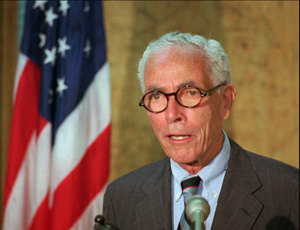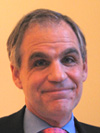| Home | Blog | Ask This | Showcase | Commentary | Comments | About Us | Contributors | Contact Us |

Citizen Sloane comes to WashingtonCOMMENTARY | December 18, 2006How an uninvited witness put on a blue shirt and a red tie, showed up at a hearing of the Senate Finance Committee and got ever so close to explaining how the nation could fund 2 million new Pell grants. This is a slightly updated version of an essay that first appeared in insidehighered.com By Wick Sloane Three feet. Three feet is how close I was to testifying before the U.S. Senate Finance Committee earlier this month. Two million Pell Grants was my offer. No luck. “Report Card on Tax Exemptions and Incentives for Higher Education: Pass, Fail, or Need Improvement?” Background: With tuition going up every year, endowments growing bigger every year, and the salary of another college president breaking the million-dollar mark seemingly every week, it’s important for the Finance Committee to closely examine what colleges and universities are doing to justify their tax-exempt status. I couldn’t have written the issue better myself. I’d been praying for a shot across the bow for these tax issues, and as a Christmas present the Republicans and the Democrats had blown off the rudder with a torpedo. Would smoke be pouring out of the chimneys at One Dupont Circle? That’s the higher ed Kremlin, with many entrenched associations. They must be thinking about burning the files before evacuating. Earlier, on the Inside Higher Education Web site, I saw the headline: “Surprising Shift For Senate Tax Panel,” about all the tax breaks and why the tuition keeps going up. I’d just finished a think-tank paper on the very topic. With some modest spins of the tax and research dials, I was offering $8.1 billion in Pell Grants. Two million new grants. I know this from Sam and Josh on “West Wing:” Don’t go to the Hill with an idea unless you know to pay for it. I knew. Blue shirt, red tie for the cameras. My chance for my country. Here’s how my testimony would open. Sound bites? We’re talking headlines: Columbia University has announced a $1 billion — or 246,913 Pell Grant — raid on the U.S. Treasury. Cornell University has also joined the game, taking away another $1 billion dollars in possible taxes. So have the University of Virginia and Yale, which are in for $3 billion each. A $5 billion drive by Harvard is said to be in the wings. These raids have the blessings of the Secretary of the Treasury, of both Houses of Congress, and of you and me. By titling the raid a “$4 billion capital campaign”, Columbia and Cornell can proceed without further approval. We, the people, have deemed contributions to such campaigns to be deductible from our income taxable by the Internal Revenue Service. In principle, Columbia will take $4 billion off the taxable income of the donors. In a conservative estimate, this translates into at least $1 billion less federal taxes collected. I looked up the committee on the Web, clicked “Contact Us” and dialed the telephone number. “Hi, my name is Sloane. I’d like to testify at the December 5, 2006 hearing on tax breaks and nonprofit status in higher education.” No lobbyists. A citizen and a telephone. Friendly voice. No. The hearing wasn’t posted yet, so the hearing was not official. I couldn’t talk with any staff about testifying until the hearing was official. Watch the Web site. But how come everyone knows there will be a hearing December 5? Well, my new friend explained, that’s the plan. But until it’s official… On the Web, the Committee schedule ended at November. Called back. “Oh, we’re going to update it for December. But the hearing isn’t official yet.” “Two million Pell Grants without new spending? There must be someone I can talk with.” No. That afternoon, a friend e-mailed the notice: Tuesday, November 28, 2006, 5:29 p.m. Hearing posted, 215 Dirksen Senate Office Building. With six witnesses, and excellent witnesses at that. Called again. Voice mail. I called the number for the Democratic minority. “You have reached the U.S. Senate voice mail system. If you know the extension….” Finally, a person. The hearing is full. No room for more witnesses. OK. I called and called and called around. Here’s how to send your comments to the public record. I did. Express mail. Did I need to offer $10 billion? I redeemed some frequent flyer miles and headed down. I called everywhere I could think of to see if there was a way to testify. I kept my cell phone charged, waiting. My only incoming call before the hearing was from Delta, a recording that my flight was delayed. The scene at a hearing: Line up outside Dirksen 215. I arrived 45 minutes early and found about 50 people already waiting. It’s a bright hallway, marble floors. People going in both directions. High heels clack, I learned. Men’s tie shoes a soft clop. This man, coming my way, no sounds at all. Senator Kennedy! Black, soft-soled walking shoes. I am a sucker for democracy. We, the people, really can be in the same room as those who govern. If we show up. The door opened. A guard let the line enter. It stopped with a dozen people ahead of me. The room was full. Being locked out did serve my story. I saw the witnesses arrive. One, Jim Duderstadt, president emeritus at University of Michigan, said hello. “I read your paper. Are you going to replace me as a witness?” No luck, I said. A few more of the people, including me, were able to enter. Get this. The people have about 50 seats in the back. Arrivals included lobbyists from the University of Texas, Harvard, the land grant colleges and universities’ association, Georgetown. What were these other seats with white sheets of paper on them, “Reserved”? Treasury, eight seats? Fair enough. ITC? JTC? Mr. Pinkert? The Embassy of the Netherlands? Another witness I know, Sue Dynarski of the Kennedy School at Harvard, had three seats reserved. She didn’t know why and offered me one. I moved from the back row, since someone else was waiting without a seat. At least 20 reserved seats were empty for the hearing, AP and Reuters, too. I don’t know how many people were stuck in the hall. But there I was, right behind the witness table. I sat and listened. Question after question from the senators. Fine replies from thoughtful witnesses. No one offering even a million new Pell Grants. An aide handed a note to Sen. Charles Grassley, the Iowan and departing committee chairman, and, I swear, Grassley looked right at me. One of my calls had worked. He was going to ask, “Is Mr. Sloane present?” No luck again. Just had to excuse himself for a moment for another hearing. Do I stand up and shout about my Pell Grants? No. Security guards. (I looked after the hearing. Half my head is right there on the Webcast, just behind the witness table.) The hearing ended. Senator Grassley was sitting right there, alone. Could I talk with him? If I walk slowly, he may leave. Too fast and will security tackle me? I walked my regular pace the 30 feet to the table for the committee. Carpet, so no sounds from my tie shoes. Staff right behind him. If I hand over my 2 million Pell paper, well, I’m told staff would rather I didn’t. If I tried to explain, well, the man had asked all the right questions already and did look tired. A compliment. A thank you. “Senator Grassley, I’ve been working on these issues for years. It’s a dream come true to have you raising these questions here in this room. Thank you.” I swear, the senator’s eyes brightened. “Well, I’m just doing my job. It’s not just my job, it’s my responsibility to raise these issues,” he said. I shook his hand. No guards to prevent me. And I headed home. This people had spoken. I’ll get my paper into the mix and more than half my head on some video file bound for the National Archives. This afternoon, a while after I write this, I’ll report for my shift as a tutor at Bunker Hill Community College. The students need these Pell Grants. Yes, I missed testifying by a few feet. In the meantime, I’ll help one student at a time. My issue is on the table, at last, back in Washington.
|
|




